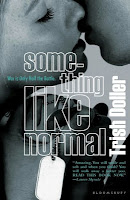The False Prince by Jennifer A. Nielsen"THE FALSE PRINCE is the thrilling first book in a brand-new trilogy filled with danger and deceit and hidden identities that will have readers rushing breathlessly to the end.
In a discontent kingdom, civil war is brewing. To unify the divided people, Conner, a nobleman of the court, devises a cunning plan to find an impersonator of the king's long-lost son and install him as a puppet prince. Four orphans are recruited to compete for the role, including a defiant boy named Sage. Sage knows that Conner's motives are more than questionable, yet his life balances on a sword's point -- he must be chosen to play the prince or he will certainly be killed. But Sage's rivals have their own agendas as well.
As Sage moves from a rundown orphanage to Conner's sumptuous palace, layer upon layer of treachery and deceit unfold, until finally, a truth is revealed that, in the end, may very well prove more dangerous than all of the lies taken together.
An extraordinary adventure filled with danger and action, lies and deadly truths that will have readers clinging to the edge of their seats." (from Goodreads)
Characters:
Sage: he has an inviting, appealing sort of voice. He's clever and self-assured but not overly cocky, with a good sense of both justice and compassion. He doesn't like to kill people unnecessarily; he tends to show mercy rather than being vindictive. Ultimately, he's disarmingly likeable.
That said, one of my biggest gripes with this book is its use of the unreliable narrator technique. This is a technique that can easily rub me the wrong way, as I have said before. I have certainly seen it employed effectively, but all too often it just frustrates me unbelievably. Unfortunately, The False Prince falls into the latter category. I can certainly see from an objective standpoint why the author chose to use this technique, but it meant we were left not understanding a lot of what Sage was doing, even though Sage was the one telling the story. The implicit trust the reader has that they are receiving the true version of the story — or at least, the way the narrator sees it — is ruined when you find out that the narrator is keeping things from you. Major spoilers, highlight to read: Like that gold rock! It just came out of nowhere and really confused me. And the reason that Sage is sneaking out all the time. Not to mention stealing the sword. Oh, and the fact that HE IS THE LOST PRINCE.
The villains: I didn't think any of the baddies were that bad in here, erring on the side of comic villains. A couple were despicable, but didn't scare me, and another was just pretty ridiculous. Hopefully in future books the villains will be nastier and more ruthless — villains to strike fear into your heart! In this book, it felt like Sage had the situation pretty much under control, and that nothing too terrible was going to happen.
Imogen: I wish Imogen had played a bigger role in helping/saving people. Mostly she just nurses Sage's wounds and gives him a shoulder to cry on, metaphorically speaking. I think there's more that could be done with her character. Her status as a young female servant in this setting makes her more vulnerable than some of the other characters, but I still think she came off a little too weak and passive. I'd like to be shown that she too is smart, and can fight for herself and what she wants.
Amarinda: I feel like we've only tapped the surface of her character in this book. I like that she, in contrast to Imogen, seems to better know what she wants. She's been brought up to think people will obey her, so she has more of a presence and commanding voice. Amarinda is so sure of herself, poised and calm — what she wants to get done is what happens. Of course, along with this she comes across as a bit conceited and snobby, too used to getting her own way — but hopefully this will change.
Premise/plot:
The False Prince is a good representation of traditional YA fantasy for younger readers. Many of the typical archetypes and familiar elements of the genre are present — a crown in danger, scheming lords, a competition...
I found the middle chunk of the book somewhat boring and repetitive; it could have used more action. Instead, similar conversations are had multiple times with different characters. None of the boys trust each other (hardly surprising, given they're being pitted against each other in a do-or-die situation) and there's plenty of backstabbing and showing off that goes on. A lot of the conversations are filled with empty threats, bluffing, and meaningless posturing that I feel could have been cut down or taken out, since it reads like filler. We don't actually see much of the training beyond a bit of sword practice and horse riding.
I have to give credit to the author, though, for clever plotting — small, seemingly insignificant details thrown in casually during the beginning and middle sections become more important towards the end. Sometimes authors seem to forget about thoughtful plotting and just pull a rabbit out of a hat to tie things up, so I always appreciate when it's clear the author has planned the storyline carefully. Given the unreliable narrator factor, I suspect this is one of those books that makes more sense when you read it a second time.
Writing style:
It's very readable and engaging, not weighed down with dense prose. There's quite a bit of dialogue (some which could have been cut, as I mentioned before).
Final verdict: 3.5 shooting stars. This first book really just seems to set up the rest of the series. It was enjoyable enough, but I don't think it has the "wow" factor that some readers think it has.






